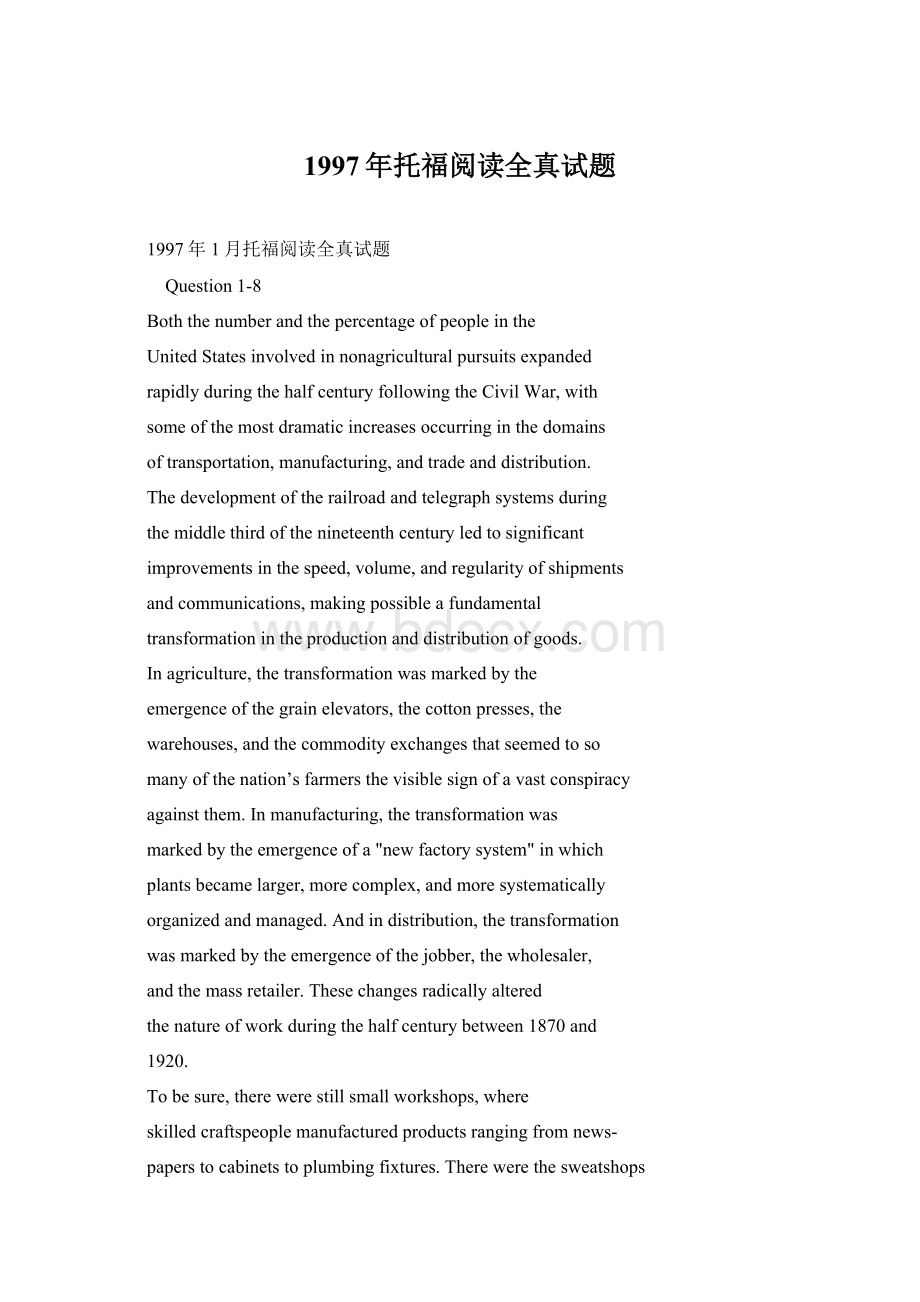1997年托福阅读全真试题.docx
《1997年托福阅读全真试题.docx》由会员分享,可在线阅读,更多相关《1997年托福阅读全真试题.docx(16页珍藏版)》请在冰豆网上搜索。

1997年托福阅读全真试题
1997年1月托福阅读全真试题
Question 1-8
Both the number and the percentage of people in the
United States involved in nonagricultural pursuits expanded
rapidly during the half century following the Civil War, with
some of the most dramatic increases occurring in the domains
of transportation, manufacturing, and trade and distribution.
The development of the railroad and telegraph systems during
the middle third of the nineteenth century led to significant
improvements in the speed, volume, and regularity of shipments
and communications, making possible a fundamental
transformation in the production and distribution of goods.
In agriculture, the transformation was marked by the
emergence of the grain elevators, the cotton presses, the
warehouses, and the commodity exchanges that seemed to so
many of the nation’s farmers the visible sign of a vast conspiracy
against them. In manufacturing, the transformation was
marked by the emergence of a "new factory system" in which
plants became larger, more complex, and more systematically
organized and managed. And in distribution, the transformation
was marked by the emergence of the jobber, the wholesaler,
and the mass retailer. These changes radically altered
the nature of work during the half century between 1870 and
1920.
To be sure, there were still small workshops, where
skilled craftspeople manufactured products ranging from news-
papers to cabinets to plumbing fixtures. There were the sweatshops
in city tenements, where groups of men and women in
household settings manufactured clothing or cigars on a piece-
work basis. And there were factories in occupations such as
metalwork where individual contractors presided over what
were essentially handicraft proprietorships that coexisted within
a single buildings. But as the number of wage earners in
manufacturing rose from 2.7 million in 1880 to 4.5 million in
1900 to 8.4 million in 1920, the number of huge plants like
the Baldwin Locomotive Works in Philadelphia burgeoned, as
did the size of the average plant. (The Baldwin Works had 600
employees in 1855, 3,000 in 1875, and 8,000 in 1900.) By
1920, at least in the northeastern United States where most of
the nation’s manufacturing wage earners were concentrated,
three-quarters of those worked in factories with more than 100
employees and 30 percent worked in factories with more than
1,000 employees.
1. The word "domains" in line 3 is closest in meaning to
(A) fields
(B) locations
(C) organizations
(D) occupations
2. What can be inferred from the passage about the agricultural sector of the economy after the Civil War?
(A) New technological developments had little effect on farmers.
(B) The percentage of the total population working in agriculture declined.
(C) Many farms destroyed in the war were rebuilt after the war.
(D) Farmers achieved new prosperity because of better rural transportation.
3. The word "fundamental" in line 7 is closest in meaning to
(A) possible
(B) basic
(C) gradual
(D) unique
4. Which of the following was NOT mentioned as part of the "new factory system?
"
(A) A change in the organization of factories.
(B) A growth in the complexity of factories.
(C) An increase in the size of factories.
(D) An increase in the cost of manufacturing industrial products.
5. Which of the following statements about manufacturing before 1870 can be inferred from the passage?
(A) Most manufacturing activity was highly organized.
(B) Most manufacturing occurred in relatively small plants.
(C) The most commonly manufactured goods were cotton presses.
(D) Manufacturing and agriculture each made up about half of the nation’s economy.
6. The word "skilled" in line 16 is closest in meaning to
(A) hardworking
(B) expert
(C) well-paid
(D) industrial
7. The word "presided over" in line 20 are closest in meaning to
(A) managed
(B) led to
(C) worked in
(D) produced
8. The author mentions the Baldwin Locomotive Works in lines 23-24 because it was
(A) a well-known metal-works
(B) the first plant of its kind in Philadelphia
(C) typical of the large factories that were becoming more common
(D) typical of factories that consisted of a single building
Question 9-19
Stars may be spheres, but not every celestial object is
spherical. Objects in the universe show a variety of shapes:
round planets (some with rings), tailed comets, wispy cosmic
gas and dust clouds, ringed nebulae, pinwheel-shaped spiral
galaxies, and so on. But none of the shapes on this list describes
the largest single entities in the universe. These are the
double radio sources, galaxies with huge clouds of radio emission
that dwarf the visible galaxies, sometimes by a factor of a
hundred or more. Stretching over distances greater t